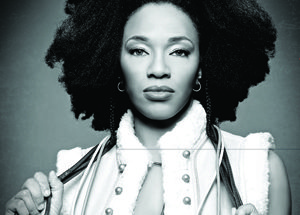Out activist and musician Doria Roberts participated in a briefing and organizing session to tackle social and economic issues at 1600 Pennsylvania Ave.
Queer feminist musician Doria Roberts was among a group of artists, activists and community organizers invited to the White House by President Obama’s Office of Public Engagement on May 12 to participate in a briefing and organizing session titled “Art, Community, Social Justice and National Recovery.”
The group was asked to tackle such issues as health care, green jobs, education and economic justice, brainstorming solutions using their unique combination of perspectives and talents. The participants were asked to report back to the Obama administration with their “strategies for cultural recovery,” according to a May 18 press release from NYK Entertainment. They were then broken down into smaller strategy session and Roberts was selected to participate in the "Green Jobs" group because of her recent work within the green movement.
While Roberts couldn't discuss what went on during the brainstroming session, she did say she felt the administration took all of their ideas to heart and believes they will be able to institute many of them.
"It definitely gave me faith that it was not window dressing, that it was something that we were going to be able to move forward with and follow up over the next week," Roberts said.
Roberts’ folk-rock anthems have been compared to the work of Ani DiFranco, but her soulful, honeyed voice is more reminiscent of Lauryn Hill or Erykah Badu. She was invited to attend the session because of her more than 15 years experience as an artist and activist.
The singer-songwriter creates music that meshes social and political commentary with soulful folk rock melodies and she has been able to combine her musical talents with a lifelong career in activism.
Along with the group Grassroots Queers, she founded Queerstock, a festival that celebrates queer artists in the music industry, in 1995 and has been producing the event ever since.
Since 2001, Roberts has also been participating in Ladyfest, a revolutionary feminist assembly, producing and performing at Ladyfest South, a four-day long festival of music, spoken word, dance, theater, art exhibits and film.
Roberts grew up in a poor urban neighborhood in Trenton, N.J., and this self-proclaimed “pissed-off, rock ’n’ roll, dyke-nigger-bitch” has been out and proud since she was a young adult.
Roberts’ big break came in the form of a Lilith Fair talent search in 1999 where she was picked to perform a 30-minute set at the festival. Afterward, she was approached by record labels and forced to take a stand as an out queer musician.
“Right after Lilith Faire with labels, my sexuality definitely came up,” Roberts said in a 2006 interview with About.com. “Could I just be maybe bisexual? Could I just maybe wait five years? The whole thing was they couldn’t figure out how to sell. It was going to be hard enough to sell a black woman who just does folk rock music, who doesn’t do R&B and that sort of stuff.”
Since then, this powerhouse queer feminist has produced six studio albums, toured the United States and abroad and started her own record label, Hurricane Doria Records.
Although Roberts wasn't specifically invited to the breifing to represent the LGBT communtiy, she said that is always part of who she is. "I always feel like I have to come as one person…that I don’t have the luxury of separating things out."
Roberts joins more than 50 other grassroots community artists and activists in Washington this month for follow up presentations, meetings and workshops.
